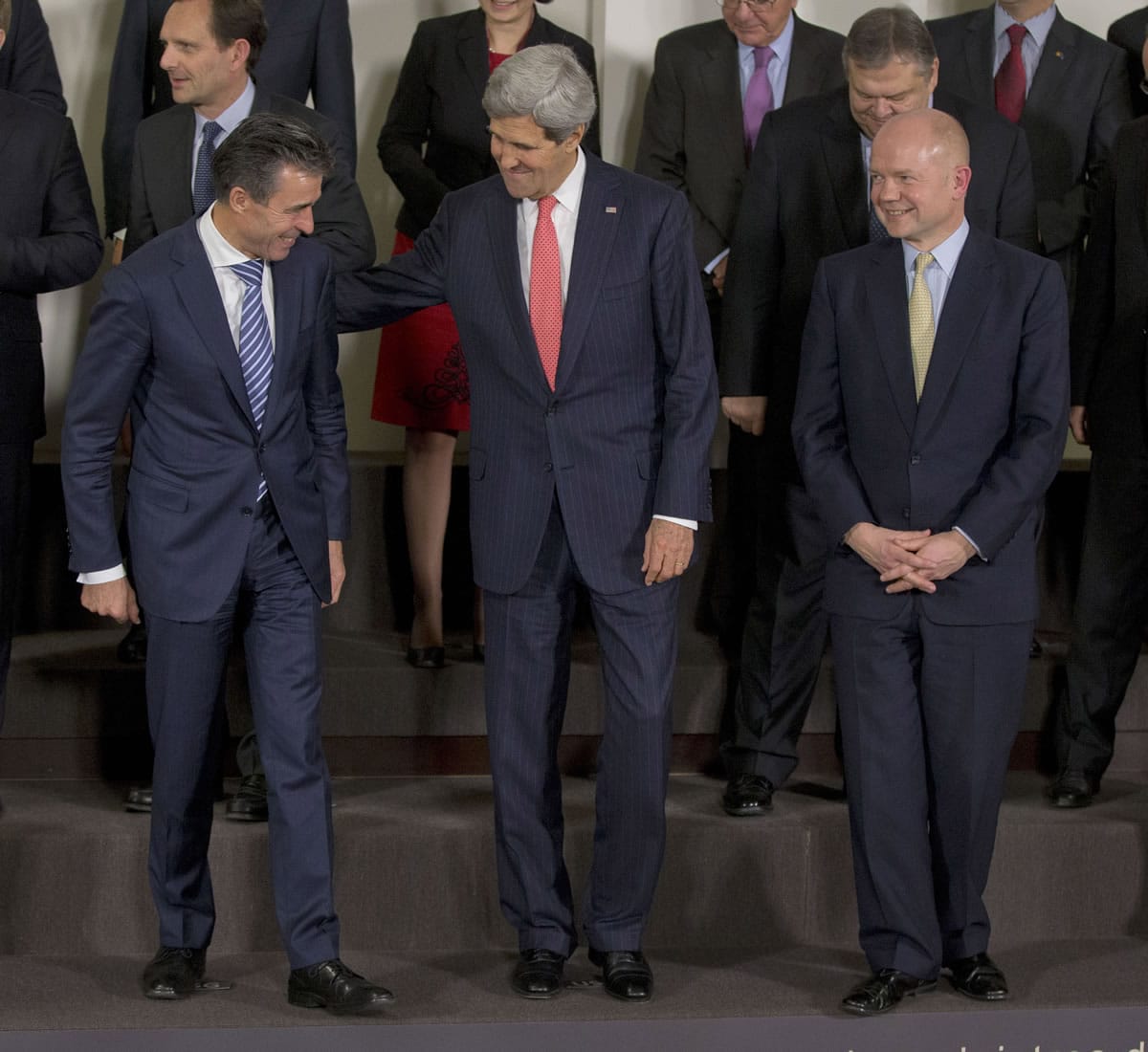BRUSSELS — World diplomats vexed over how to secure Afghanistan’s future used a looming year-end deadline on Tuesday to persuade the war-torn nation’s leaders that allowing thousands of foreign troops to remain there beyond next year is better than being left to protect the country alone.
The latest round of pressure on Afghan President Hamid Karzai puts the U.S. and its NATO allies in the awkward political position of threatening to leave even as they make a strong case to stay.
It also heightens the possibility of a “zero option” — withdrawing all allied military forces from Afghanistan when the combat mission there ends at the end of 2014. The zero option gives the U.S. and NATO nations an unintended advantage: It would allow them to refocus shrinking budgets on security risks elsewhere in the world as al-Qaida’s threat in Afghanistan wanes.
The dilemma in the war that President Barack Obama championed as a political candidate was a top topic at an annual forum of NATO ministers who will hear from two senior Afghan officials on Wednesday.
It was clear from Tuesday’s meeting that NATO, which has supplied military forces to Afghanistan since 2001, does not want to fully withdraw. A spokeswoman said ministers were in agreement that Kabul needs to sign the U.S. security pact soon, in order to move forward with a similar plan to keep allied troops there.
In all, U.S. and NATO could keep between 8,000 and 12,000 troops in Afghanistan beyond 2014. Of those, the U.S. is expected to provide no more than 8,000 to train, equip and assist Afghan security forces.
Karzai has tentatively endorsed the deal, but he shocked allies last month when he refused to sign it after it was approved by a council of tribal elders known as the Loya Jirga. The council said the agreement with the U.S. should be signed by the end of December, as Washington demands.
Instead, Karzai maintains the decision should be left to his successor after elections next April. He has also indicated that he will not sign any agreement that allows for continued airstrikes and foreign raids on Afghan homes. Civilian deaths at the hands of U.S. and allied soldiers have been a key source of contention, exacerbated last week by a U.S. drone strike that killed a child.
“We have to plan,” said German Foreign Minister Guido Westerwelle, adding that his country is prepared to contribute to a training mission in Afghanistan after combat operations end. Germany has nearly 3,400 troops in Afghanistan and major regional responsibility in the north.
But Westerwelle warned against running out the clock. “We also have to make logistical decisions,” he said.
Experts said the longer Karzai delays, the stronger the risk that the West will decide the training mission isn’t worth the cost.
The price tag for American military assistance alone runs between $15 billion and $37 billion annually. More than $8 billion per year — half in security funding, half in development assistance — is set to be spent by the U.S. and others in Afghanistan after 2014, and voters in Europe and America are growing weary of the mission.
Additionally, al-Qaida’s operational might has mostly moved from Afghanistan and Pakistan to Yemen, Iraq, and northern Africa.
“This is not the center of the threat anymore,” said Anthony Cordesman, a Middle East and military expert at the Center for Strategic and International Studies in Washington. He said the Afghan training mission is “an expensive posture, even once reduced and it is not clear, exactly, what the U.S. staying will accomplish.”
The U.S. and NATO have so far trained more than 345,000 Afghan security forces over the last decade.
It’s not clear if the U.S. and NATO will abort their training plans if an Afghan agreement is not reached by the end of the year.
In a blunt exchange with Karzai last month, U.S. national security adviser Susan Rice said Washington is prepared to start planning for a full troop withdrawal if Afghanistan does not sign the agreement promptly. But in an opinion piece published three days later, retired Marine Gen. John Allen, the former U.S. and NATO commander in Afghanistan, urged Washington to “stay patient” and wait for Karzai’s successor to make the decision next spring.
On Tuesday, NATO Secretary General Anders Fogh Rasmussen stopped short of demanding a deadline for Karzai to sign, but noted Afghanistan was risking future assistance.
“My concern is that if we are not able to deploy a training missing to Afghanistan, it may have a negative impact on the security situation in Afghanistan, and furthermore, it may also have a negative impact on the provision of financial aid to Afghanistan,” Rasmussen said.
The issue marks the second time in Obama’s presidency that he has had to negotiate keeping troops in a war zone. Obama withdrew combat troops from Iraq when the war there ended in 2011. Since then, violence has spiked and al-Qaida has had a resurgence against a sharply divided government in Baghdad.
“This is Obama’s war, like it or not,” Cordesman said of Afghanistan. “He faces a problem of what will happen, historically and politically, if he is seen as being pushed out. …There are a lot of reasons why they have to be extremely cautious about backing away from this war.”



